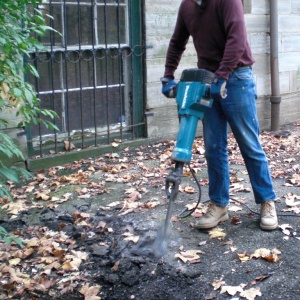What is Depaving?
Depaving is an opportunity to turn your paved yard or lot into a lawn or garden by removing concrete, asphalt or other impervious surfaces.
Depaved areas can become rain gardens, landscaping, lawn space or even provide space for a pervious patio, walkway or deck.
In Philadelphia, many homes contain yards that are entirely covered with concrete, making great candidates for depaving.
Why Depave Your Yard?
Depaving clears space for lush and attractive yard spaces that filter pollutants from our water and air and provide numerous ecological benefits.
By removing an impervious surface such as concrete or asphalt, water can be absorbed into the ground, recharging groundwater aquifers.
Water that absorbs into the ground is less likely to end up in storm drains and carry stormwater pollution into our waterways.
Thinking about Depaving?
|
Make sure to develop a plan. A depaving project requires careful consideration to ensure a safe and successful outcome.
Call before you dig! It’s the law. Call 811 to determine the location of utility lines on your property at least two days before starting your project.
Your landscaping plan for the depaved site should consider the way that stormwater travels across the property. A good plan will prevent erosion and messy runoff.
Hardware stores and home improvement centers rent a variety of tools, such as electric jackhammers and concrete cutting saws, which will make this hard work a bit easier. Start at the edges so the breaking pavement has a place to move.
Protect yourself! Earplugs, goggles, gloves, good shoes, a dust mask and long sleeves are a must when breaking up pavement.
The difficulty of a depaving project depends on the size, composition and construction of the surface. Asphalt is generally softer and easier to remove than concrete. Concrete installations with steel reinforcement (rebar) will likely need professional attention for removal.
Don’t forget - Asphalt is a recyclable material and concrete can be reused in a variety of ways. Get creative when finding ways to dispose of your rubble.
|
 |
For More Information
How To Depave : A guide to depaving
National Demolition Association : Locate a contractor in your area.
Disclaimer
This website content is provided to you on an “AS IS” and “WITH ALL FAULTS” basis. You acknowledge that you assume the entire risk of loss in using this information, including without limitation any loss incurred by any End User. You further acknowledge that this content is complex and may contain some nonconformities, defects and/or errors. PWD does not warrant that this website will meet your needs or expectations, or that all nonconformities can or will be corrected. PWD assumes no risk, liability or responsibility for the accuracy of this guide. See full disclaimer
